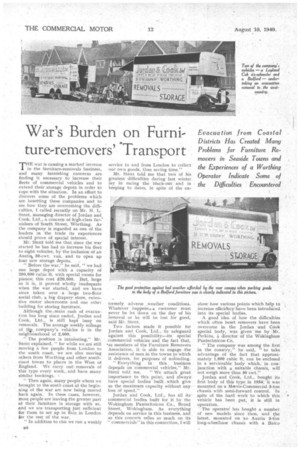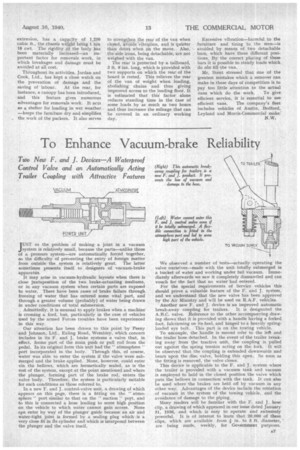War's Burden on Furni ture-removers' Transport
Page 24

Page 25

If you've noticed an error in this article please click here to report it so we can fix it.
THE war is causing a marked increase in the furniture-removals business, and many furnishing concerns are
finding it necessary to increase their fleets of commercial vehicles and to extend their storage depots in order to cope with the situation. In an effort to discover some of the problems which are besetting these companies and to see, how they are overcoming the difficulties, I called recently on Mr. H. L.
Stent, managing director of Jordan and Cook, Ltd„ a concern of high-class fur-' nishers of South Street, Worthing. As the company is regarded as one of the leaders in the trade its experiences should prove of special interest.
Mr. Stent told me that since the war started he has had to increase his fleet
to eight vehicles, by the inclusion of an Austiqw 50-cwt. van, and to open up
four new storage depots. ..
"Before the war," he said, "we had one large depot with a capacity of 200,000 cubio ft. with special rooms for pianos; this cost 220,000. But, large as it is, it proved wholly inadequate when the war started, and we have since taken over a large two-flobr social club, a big drapery store, extensive motor showrooms and one other building for storing furniture.
Although the., main rush of evacuation-has long since ended, Jordan and Cook, Ltd., is still kept busy on removals. The average weekly mileage Of tlip company's vehicles is in the neighbourhood of 2,000.
" The position is interesting." Mr. Stent explained, " for while we are still moving a few people from London to the south coast, we are also moving others from Worthing and other south coast towns to places in the West of England. We carry out -removals of this type every week„ and have many similar bookings. \ " Then again, many people whom we • brought to the south coast at the beginning of the war are now being moved back again. In these cases, however, most people are leaving the greater part of their furniture in storage with us, and we are transporting just sufficient for them to set up in flats in London for the rest of the war.
" In addition to this we run a weekly service to and from London to collect our own goods; thus saving time."
Mr. Stent told trie that two of his greatest difficulties during • last winter lay in racing the black-out and in keeping to dates, in spite of the ex tremely adverse , weather conditions. Whatever happens• a customer most never he let down on the day of his removal or he will be lost for good, said Mr. Stent.
Two factors made it possible for Jordan and Cook, Ltd., to safeguard against this possibility,—its special commercial vehicles and the fact that, 'as members of the Furniture Removers Association, it is able to engage the assistance of men,in the towns to which it delivers, for purposes of unloading. "
Everything in this business depends on commercial vehicles," Mr.
Stent told me. " We attach great importance to this point, and always,. have special bodies built which give us the maximum capacity without any loss of speed."
Jordan and Cook, Ltd., has all its commercial bodies built for it by the Wokingham Pantechnicon Co., Broad Street, Wokingham. As everything depends on service in this business, and as this concern relies so much on its ." commercials" in this connection, I will show how various points which help to • increase efficiency have been introduced into its special bodies.
A good idea of how the difficulties which often beset removers have been overcome in the Jordan and Cook special body, was given me by Mr. Perkins, 5, director of the Wokingham Pantechnicon Co.
" The company was among the first in the country," he said, to take advantage of the fact that approximately 1,000 cubic ft. can be enclosed in a serviceable body which, in conjunction with a suitable chassis, will not weigh more than 50 cwt."
Jordan and Cook, Ltd., bought its first body of this type in 1934; it was • mounted on a Morris-Commercial 3-ton chassis with semi-forward control. In spite of the hard work to which this vehicle has been put, it is still in operation. • . The operator has bought a number of new models since then, and the latest, mounted on an Austin 3-fon long-wheelbase chassis with a Baico extension, has a capacity of 1,250 cubic ft., the chassis weight being 1 ton 16 cwt. The rigidity of the body has been materially increased—an important factor for removals work, in which breakages and damage must be avoided at all cost.
Throughout its activities, Jordan and Cook, Ltd., has kept a close watch on the prevention of damage and the saving of labour. At the rear, for instance, a canopy has been introduced, and this feature gives numerous advantages for removals work. It acts as a shelter for loading in wet weather —keeps the furniture dry and simplifies the work of the packers. It also serves to strengthen the rear of the van when closed, avoids vibration, and is quieter than doors when on the move. Also, the side irons, being detachable, are not weighed with the van.
The rear is protected by a tailboard, 3 ft. 9 in. long, which is provided with two supports on which the rear of the board is rested. This relieves the rear of the van of weight when loading, abolishing chains and thus giving improved access to the loading floor. It is estimated that this factor alone reduces standing time in the case of some loads by as much as two hours and thus increases the mileage that can be covered in an ordinary working day. Excessive vibration—harmful to the furniture and tiring to the men—is avoided by means of two detachable bars, which have three different positions. By the correct placing of these bars it is possible to steady loads. which. do nht fill the van.
Mr. Stent stressed that one of the greatest mistakes which a remover can make in these days of competition is to pay too little attention to the actual vans which do the work. To give efficient service, it is essential to use efficient vans. The coimpany's fleet includes vehicles of Austin, Bedford, Leyland and Morris-Commercial make.' N.W.




















































